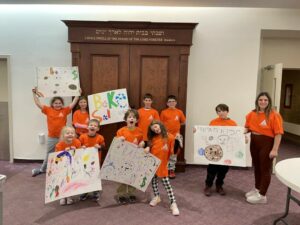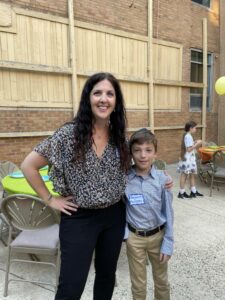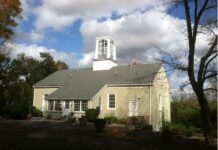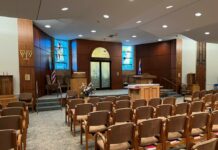
Beth Sholom Congregation on Old York Road in Elkins Park is known in the Philadelphia area for a few reasons.
It has “the Frank Lloyd Wright building,” or the only synagogue ever designed by the famous architect. It’s been the childhood and adult synagogue of Pennsylvania Gov. Josh Shapiro.
It also has endured the struggles that many congregations have gone through in recent decades. Beth Sholom had a peak of about 850 members in the 1980s. By the 2020s, though, it was down to around 450. The Conservative congregation even rents space in its building to a Reform community, Congregation Kol Ami.
Yet since June, Beth Sholom is becoming known in the community for a new reason: the agreement it offers to Jewish parents looking for a preschool for their kids. Families can get reduced tuition if they agree to attend six to eight events per year.
This offer has been on the table for more than a decade. Beth Sholom Executive Director Danielle Otero took advantage of it with her family when they joined in 2013. But it is gaining in popularity post-pandemic, according to synagogue leaders.
Forty-four new families have joined since June.
“They want community,” said Beth Sholom’s longtime rabbi, David Glanzberg-Krainin.
The types of events that families commit to when they enroll their children in the Brodie Family Early Learning Center are tot Shabbats, lunch and learns and meals in the Sukkah during Sukkot, according to Otero. Some are with the kids. Others are just for parents.
“What we’ve found is that parents are coming to far more events than they are required to come to,” said Ruth Lefton, the president of the synagogue’s board of directors. “We’re building community that way.”
It starts out as a requirement, according to Otero. But once parents come to a few events, they “keep coming back.” Rabbi Glanzberg-Krainin estimates that 20-24 events are being planned per year by the synagogue’s parent-teacher organization.
“There’s such a desire for families to come together,” he said.
The Brodie Family Early Learning Center had about 80 students enrolled before the pandemic, according to the rabbi. Then the number dropped during COVID. But today, it’s more than 90.
Beth Sholom’s religious school is also growing, according to Lefton. And once families grow out of the preschool, they get similar events but for families with kids in elementary school.
The rabbi identified three reasons for the increases.
“In the post-pandemic world, there’s a sense of isolation,” he said. “People want to be connected to peers.”

On a more practical level, many families today have two working parents.
“There’s clearly a need for child care,” the rabbi said.
And as millennial parents get older, many realize that they want to pass Jewish values down to their kids.
“There’s a hunger for people to feel like there’s a place where values can be taught and practiced,” Glanzberg-Krainin said. “A synagogue provides this Jewish framework for helping parents raise their kids to become mensches.”
Out of those 44 new households, a majority are younger families, according to Otero. But there are also “quite a few grandparents.”
“There’s multigenerational community building,” she said. “You can create bonds.”
Otero, who took over as executive director in December, thinks that “we’re really coming back since COVID.” Her goal now is to keep the focus on family engagement. A family engagement director, Jan Nossbaum, joined the synagogue staff post-pandemic.
Lefton also said that, “We try to make sure that our congregation is aware that we have new members.” They are always highlighted in the synagogue newsletter.
“And they also see us investing in our facility,” she said.
A $1.7 million capital campaign is underway, according to synagogue leaders. The private phase of the campaign is over, and now the executive director, rabbi and board president are opening it to the public. They have enough money on hand to feel confident that they will complete the project by the summer.
It has three pillars, according to Glanzberg-Krainin. Accessibility upgrades should include ramps and an elevator. Security enhancements will likely feature a two-step process to enter the building in which you are “seen and identified before you enter,” the rabbi said. The renovation and expansion of the outdoor courtyard should allow it to host services, bar and bat mitzvahs and summer camp activities.
“It’s all congregant money,” Glanzberg-Krainin said. “They’re finding the connection here because we’re putting resources and staff and time into building those connections.”






